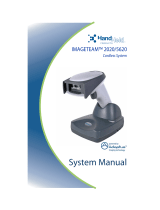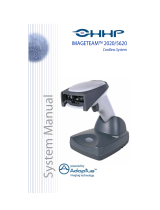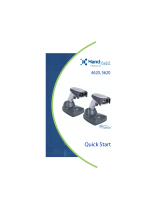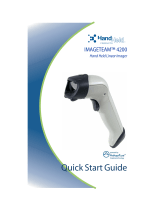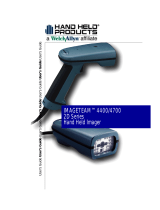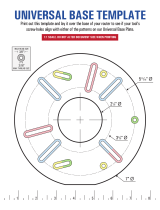Page is loading ...

™
IMAGETEAM™ 2020/4620
Area Imager Cordless System
System Manual

Disclaimer
Hand Held Products, Inc. (“Hand Held Products”) reserves the right to make
changes in specifications and other information contained in this document
without prior notice, and the reader should in all cases consult Hand Held
Products to determine whether any such changes have been made. The
information in this publication does not represent a commitment on the part of
Hand Held Products.
Hand Held Products shall not be liable for technical or editorial errors or
omissions contained herein; nor for incidental or consequential damages
resulting from the furnishing, performance, or use of this material.
This document contains proprietary information which is protected by copyright.
All rights are reserved. No part of this document may be photocopied,
reproduced, or translated into another language without the prior written consent
of Hand Held Products.
© 2005 Hand Held Products, Inc. All rights reserved.
Web Address: www.handheld.com
Microsoft Pocket PC 2002, Windows, Windows NT, Windows 2000, Windows ME,
Windows XP, ActiveSync, Outlook, and the Windows logo are trademarks or registered
trademarks of Microsoft Corporation.
The Bluetooth® word mark and logos are owned by Bluetooth SIG, Inc.

Statement of Agency Compliance
The IT2020-5B/IT4620 system meets or exceeds the requirements of all
applicable standards organizations for safe operation. However, as with any
electrical equipment, the best way to ensure safe operation is to operate them
according to the agency guidelines that follow. Please read these guidelines
carefully before using your IT2020-5B/IT4620 system.
Regulatory and Safety Approvals for the IT2020-5B/
IT4620
FCC Class B Compliance Statement
This device complies with part 15 of the FCC Rules. Operation is subject to the
following two conditions:
1. This device may not cause harmful interference.
2. This device must accept any interference received, including interference
that may cause undesired operation.
This equipment has been tested and found to comply with the limits for a Class
B digital device pursuant to part 15 of the FCC Rules. These limits are designed
to provide reasonable protection against harmful interference in a residential
installation. This equipment generates, uses, and can radiate radio frequency
energy and, if not installed and used in accordance with the instructions, may
cause harmful interference to radio communications. If this equipment does
cause harmful interference to radio or television reception, which can be
determined by turning the equipment off and on, the user is encouraged to try to
correct the interference by one or more of the following measures:
• •Reorient or relocate the receiving antenna.
• •Increase the separation between the equipment and receiver.
• •Connect the equipment into an outlet on a circuit different from that to which
the receiver is connected.
• •Consult the dealer or an experienced radio or television technician for help.
Parameter Specification
USA FCC Part 15, Class B
Canada ICES-003
European Community EN 55022 (CISPR 22) Class B
EN60950
EN60825-1
EN55024:1998

If necessary, the user should consult the dealer or an experienced radio/
television technician for additional suggestions. The user may find the following
booklet helpful: “Something About Interference.” This is available at FCC local
regional offices. Hand Held Products, Inc. is not responsible for any radio or
television interference caused by unauthorized modifications of this equipment
or the substitution or attachment of connecting cables and equipment other than
those specified by Hand Held Products, Inc. The correction is the responsibility
of the user. Use only shielded data cables with this system.
In accordance with FCC 15.21, changes or modifications not expressly
approved by the party responsible for compliance could void the user’s authority
to operate the equipment.
This device and its antenna must not be co-located or operating
in conjunction with any other antenna or transmitter. To maintain
compliance with FCC RF exposure guidelines for body-worn
operation, do not use accessories that contain metallic
components and ensure that the device is at least 15mm (0.6
inches) from the body.
Canadian Compliance
This Class B digital apparatus compiles with Canadian ICES-003. Operation is
subject to the following two conditions:
1. This device may not cause harmful interference.
2. This device must accept any interference received, including interference
that may cause undesired operation.
3. To prevent radio interference to the licensed service, this device is intended
to be operated indoors and away from windows to provide maximum
shielding. Equipment (or its transmit antenna) that is installed outdoors is
subject to licensing.
Cet appareil numérique de la Classe B est conforme à la norme NMB-003 du
Canada.
CE Compliance
The CE mark on the product indicates that the system has been tested
to and conforms with the provisions noted within the 89/336/EEC
Electromagnetic Compatibility Directive and the 73/23/EEC Low Voltage
Directive.
Complies with:
EN55022:1998 (for ITE emissions)
EN55024:1998 (for ITE immunity), including CISPR 22B:1997
EN61000-4-2:1995
EN61000-4-3:1995
!

For CE-related inquiries, please contact:
Hand Held Products, Inc.
Nijverheidsweg 9
5627 BT Eindhoven
The Netherlands
Hand Held Products shall not be liable for use of our product with equipment
(i.e., power supplies, personal computers, etc.) that is not CE marked and does
not comply with the Low Voltage Directive.
Regulatory Approvals for Bluetooth Radio Devices
RF devices are designed to comply with the most current applicable standards
on safe levels of RF energy developed by the Institute of Electrical and
Electronics Engineers (IEEE) and the American National Standards Institute
(ANSI) and have been recommended for adoption by the Federal
Communications Commission (FCC).
Bluetooth Radio Device R&TTE Compliance Statement
The IT2020-5B and IT4620 are in conformity with all essential requirements of
the R&TTE Directive (1999/5/EC). This equipment has been assessed to the
following standards:
This product is marked with in accordance with the Class II product
requirements specified in the R&TTE Directive, 1999/5/EC.
The equipment is intended for use throughout the European Community.
Parameter Specification
RF Approvals
U.S.A. FCC Part 15.247
Canada RSS 210
Parameter Specification
R&TTE EN 300 328-2:2000
EN 301 489-1 (2002-08)
EN 301 489-17 (2002-08)
EN 60950:2000
EN 50361:2001

Bluetooth Qualified Product
Bluetooth Qualified Body approved as a Bluetooth Class II radio.
UL and cUL Statement
UL listed UL1950 and CSA 22.2 No.950. cUL listed UL1950 and CSA 22.2 No
950.
LED Safety Statement
This device has been tested in accordance with EN60825-1 LED safety, and has
been certified to be under the limits of a Class 1 LED device.
TÜV Statement
TÜV or GS marked to EN60950 and EN60825-1.
C-Tick Statement
Conforms to AS/NZS 3548. C-Tick number: N10410.
Mexico
Patents
Please refer to the IT4620 packaging for patent information.
Solids and Water Protection
The IT4620 has a rating of IP41, immunity of foreign particles and dripping
water.
Certified

Required Safety Labels
www.handheld.com
B
IT4620

'
'
B2
0
72XM5D
H
:DI
C
CF
B
2072
X
M
B396
1
C
I
ada
naC
.c
nI
,stc
u
dorP
d
leH
d
n
a
H
3
5131YN,s
l
laFs
e
letaenak
S
"anihC
ni
edaM"
047351E
gnidnePstnetaPn
g
ie
ro
FdnaSU
2860
.E
.
T.I
YROS
SECCA
12D7
mo
c.
dl
e
hd
n
a
h.
www
B
IT2020-5B

i
Chapter 1 - Getting Started
About This Manual ............................................................... 1-1
Unpacking the System .......................................................... 1-2
IT4620 Models...................................................................... 1-2
Cordless System: Main Components.................................... 1-2
About the Battery.................................................................. 1-3
Proper Disposal of the Battery.............................................. 1-4
Connecting the Base When Powered by Host
(Keyboard Wedge)............................................................. 1-4
Connecting the Base with USB ............................................ 1-5
Connecting the Base with RS-232 Serial Port...................... 1-6
Connecting the Base with Serial Wedge .............................. 1-7
Linking Imager to Base ........................................................ 1-8
Communication Between the Cordless System and
the Host................................................................................. 1-9
Reading Techniques............................................................ 1-10
Chapter 2 - Programming the Interface
Introduction........................................................................... 2-1
Plug and Play ........................................................................ 2-1
Keyboard Wedge Connection............................................... 2-1
Laptop Direct Connect ................................................... 2-1
RS-232............................................................................ 2-2
Wand Emulation Plug & Play ........................................ 2-2
IBM 4683 Ports 5B, 9B, and 17 Interface ............................ 2-3
IBM SurePos......................................................................... 2-4
USB PC or Macintosh Keyboard ................................... 2-4
USB HID........................................................................ 2-5
USB Com Port Emulation.............................................. 2-5
Serial Wedge......................................................................... 2-6
Resetting the Standard Product Default Settings:
Current Application Work Group ...................................... 2-7
Resetting the Standard Product Default Settings: All
Application Work Groups.................................................. 2-7
Table of Contents

ii
Programming the Interface - Terminal ID Method............... 2-8
Supported Terminals............................................................. 2-9
Keyboard Country .............................................................. 2-11
Keyboard Style ................................................................... 2-13
Keyboard Modifiers............................................................ 2-14
RS-232 Baud Rate........................................................ 2-16
RS-232 Word Length: Data Bits, Stop Bits, and Parity2-17
RS-232 Receiver Time-Out.......................................... 2-18
RS-232 Handshaking ................................................... 2-18
Host ACK Selection..................................................... 2-19
Host ACK Enable......................................................... 2-20
Wand Emulation ................................................................. 2-21
Wand Emulation Connection ....................................... 2-21
Wand Emulation Data Block Size................................ 2-22
Wand Emulation Delay Between Blocks..................... 2-23
Wand Emulation Overall Checksum............................ 2-23
Wand Emulation Transmission Rate............................ 2-24
Wand Emulation Polarity............................................. 2-24
Wand Emulation Idle ................................................... 2-25
Chapter 3 - Basic System Operation
Cordless Base........................................................................ 3-1
RF (Radio Frequency) Module Operation............................ 3-1
Cordless Imager.................................................................... 3-1
System Conditions................................................................ 3-2
Linking Process.............................................................. 3-2
Imager Is Out of Range.................................................. 3-2
Imager Is Moved Back Into Range ................................ 3-2
Out of Range and Back into Range with Data Accumulation
Mode On......................................................................... 3-2
Base Charge Mode................................................................ 3-3
Beeper and LED Sequences and Meaning............................ 3-4
IT4620 LED Sequences and Meaning ........................... 3-4
IT2020-5B LED Sequences and Meaning ..................... 3-4
Imager Modes ....................................................................... 3-5
Unlinking the Imager ..................................................... 3-5

iii
Single Imager Operation ....................................................... 3-5
Locked Link Mode - Single Imager ............................... 3-5
Open Link Mode - Single Imager................................... 3-6
Override Locked Imager ................................................ 3-6
Multiple Imager Operation ................................................... 3-6
Imager Name......................................................................... 3-7
Imager Report ....................................................................... 3-8
Application Work Groups..................................................... 3-8
Application Work Group Selection................................ 3-9
Resetting the Standard Product Default Settings: All
Application Work Groups ................................................ 3-10
Resetting the Standard Product Default Settings:
Current Application Work Group..................................... 3-10
Using the Imager with Bluetooth Devices .......................... 3-11
Changing Bluetooth PIN Code..................................... 3-11
Out-of-Range Alarm ........................................................... 3-12
Duration........................................................................ 3-12
Alarm Sound Type ....................................................... 3-12
Data Accumulation Mode ................................................... 3-13
Chapter 4 - Output
Good Read Indicators ........................................................... 4-1
Beeper – Good Read....................................................... 4-1
Beeper Volume – Good Read......................................... 4-1
Beeper Pitch – Good Read ............................................. 4-2
Beeper Duration – Good Read ....................................... 4-2
LED – Good Read .......................................................... 4-2
Number of Beeps – Good Read...................................... 4-3
Good Read Delay.................................................................. 4-3
User-Specified Good Read Delay......................................... 4-3
Serial Trigger Modes ............................................................ 4-4
Manual/Serial Trigger, Low Power................................ 4-4
Scan Stand Mode .................................................................. 4-6
Scan Stand Symbol......................................................... 4-6

iv
Presentation Mode ................................................................ 4-6
Presentation LED Behavior after Decode ...................... 4-7
Presentation Sensitivity.................................................. 4-7
Hands Free Time-Out ........................................................... 4-7
Reread Delay ........................................................................ 4-8
User-Specified Reread Delay ............................................... 4-8
LED Power Level ................................................................. 4-9
Illumination Lights ............................................................... 4-9
Aimer Delay........................................................................ 4-10
User-Specified Aimer Delay ........................................ 4-10
Aimer Mode........................................................................ 4-11
Centering............................................................................. 4-11
Decode Search Mode.......................................................... 4-13
Output Sequence Overview ................................................ 4-14
Output Sequence Editor ............................................... 4-16
Require Output Sequence............................................. 4-16
Multiple Symbols ............................................................... 4-17
No Read .............................................................................. 4-17
Print Weight........................................................................ 4-18
Video Reverse..................................................................... 4-18
Working Orientation........................................................... 4-19
Chapter 5 - Data Editing
Prefix/Suffix Overview......................................................... 5-1
To Add a Prefix or Suffix: ............................................. 5-2
To Clear One or All Prefixes or Suffixes:...................... 5-3
To Add a Carriage Return Suffix to all Symbologies .... 5-3
Prefix Selections............................................................. 5-4
Suffix Selections ............................................................ 5-4
Function Code Transmit................................................. 5-4
Intercharacter, Interfunction, and Intermessage Delays ....... 5-5
Intercharacter Delay ....................................................... 5-5
User Specified Intercharacter Delay .............................. 5-6
Interfunction Delay ........................................................ 5-6
Intermessage Delay ........................................................ 5-7
Chapter 6 - Data Formatting

v
Data Format Editor Introduction........................................... 6-1
To Add a Data Format.................................................... 6-1
Other Programming Selections ...................................... 6-2
Data Format Editor Commands...................................... 6-2
Data Format Editor......................................................... 6-5
Data Formatter................................................................ 6-5
Alternate Data Formats .................................................. 6-6
Chapter 7 - Symbologies
All Symbologies ................................................................... 7-2
Message Length Description................................................. 7-2
Codabar ................................................................................ 7-3
Codabar Start/Stop Characters....................................... 7-3
Codabar Check Character............................................... 7-4
Codabar Concatenation .................................................. 7-5
Codabar Message Length ............................................... 7-5
Code 39 ................................................................................ 7-6
Code 39 Start/Stop Characters....................................... 7-6
Code 39 Check Character............................................... 7-7
Code 39 Message Length ............................................... 7-7
Code 39 Append............................................................. 7-8
Code 32 Pharmaceutical (PARAF) ................................ 7-8
Full ASCII ...................................................................... 7-9
Code 39 Code Page ...................................................... 7-10
Interleaved 2 of 5 ............................................................... 7-10
Check Digit................................................................... 7-11
Interleaved 2 of 5 Message Length .............................. 7-11
Code 93 .............................................................................. 7-12
Code 93 Message Length ............................................. 7-12
Code 93 Code Page ...................................................... 7-13
Code 2 of 5 ......................................................................... 7-13
Code 2 of 5 Message Length........................................ 7-13
IATA Code 2 of 5 .............................................................. 7-14
IATA Code 2 of 5 Message Length ............................. 7-14
Matrix 2 of 5 ...................................................................... 7-15
Matrix 2 of 5 Message Length ..................................... 7-15

vi
Code 11 .............................................................................. 7-16
Check Digits Required ................................................. 7-16
Code 11 Message Length ............................................. 7-16
Code 128 ............................................................................ 7-17
ISBT 128 Concatenation.............................................. 7-17
Code 128 Message Length ........................................... 7-18
Code 128 Code Page .................................................... 7-18
Telepen .............................................................................. 7-18
Telepen Output............................................................. 7-19
Telepen Message Length.............................................. 7-19
UPC-A ............................................................................... 7-19
UPC-A Check Digit ..................................................... 7-20
UPC-A Number System............................................... 7-20
UPC-A Addenda .......................................................... 7-20
UPC-A Addenda Required........................................... 7-21
UPC-A Addenda Separator .......................................... 7-21
UPC-A/EAN-13
with Extended Coupon Code .......................................... 7-21
UPC-E0 .............................................................................. 7-22
UPC-E0 ........................................................................ 7-22
UPC-E0 Expand........................................................... 7-22
UPC-E0 Addenda Required ......................................... 7-23
UPC-E0 Addenda Separator ........................................ 7-23
UPC-E0 Check Digit.................................................... 7-23
UPC-E0 Number System ............................................. 7-24
UPC-E0 Addenda......................................................... 7-24
UPC-E1 .............................................................................. 7-24
EAN/JAN-13 ..................................................................... 7-25
EAN/JAN-13 Check Digit ........................................... 7-25
EAN/JAN-13 Addenda ................................................ 7-26
EAN/JAN-13 Addenda Required................................. 7-26
EAN/JAN-13 Addenda Separator ................................ 7-26
ISBN Translate............................................................. 7-27

vii
EAN/JAN-8 ........................................................................ 7-27
EAN/JAN-8 Check Digit.............................................. 7-27
EAN/JAN-8 Addenda................................................... 7-28
EAN/JAN-8 Addenda Required................................... 7-28
EAN/JAN-8 Addenda Separator .................................. 7-28
MSI .................................................................................... 7-29
MSI Check Character ................................................... 7-29
MSI Message Length.................................................... 7-30
Plessey Code ...................................................................... 7-30
Plessey Message Length............................................... 7-30
RSS-14 ............................................................................... 7-31
RSS Limited ....................................................................... 7-31
RSS Expanded ................................................................... 7-32
RSS Expanded Message Length................................... 7-32
PosiCode ............................................................................ 7-33
PosiCode Message Length ........................................... 7-33
Trioptic Code ..................................................................... 7-34
Codablock F ....................................................................... 7-34
Codablock F Message Length ...................................... 7-35
Code 16K ........................................................................... 7-35
Code 16K Message Length .......................................... 7-35
Code 49 .............................................................................. 7-36
Code 49 Message Length ............................................. 7-36
PDF417 .............................................................................. 7-37
PDF417 Message Length ............................................. 7-37
MicroPDF417 .................................................................... 7-37
MicroPDF417 Message Length.................................... 7-38
EAN•UCC Composite Codes ............................................ 7-38
UPC/EAN Version ....................................................... 7-39
EAN•UCC Composite Code Message Length ............. 7-39

viii
EAN•UCC Emulation ........................................................ 7-40
TCIF Linked Code 39 (TLC39) ......................................... 7-40
Postal Codes ....................................................................... 7-41
Postnet.......................................................................... 7-41
Planet Code .................................................................. 7-42
British Post................................................................... 7-42
Canadian Post............................................................... 7-42
Kix (Netherlands) Post................................................. 7-43
Australian Post ............................................................. 7-43
Japanese Post................................................................ 7-43
China Post .......................................................................... 7-44
China Post Message Length ......................................... 7-44
Korea Post .......................................................................... 7-45
Korea Post Message Length......................................... 7-45
QR Code ............................................................................ 7-46
QR Code Message Length ........................................... 7-46
Data Matrix ........................................................................ 7-47
Data Matrix Message Length ....................................... 7-47
MaxiCode .......................................................................... 7-48
MaxiCode Message Length.......................................... 7-48
Aztec Code ......................................................................... 7-49
Aztec Code Message Length........................................ 7-49
Aztec Runes ................................................................. 7-49
Chapter 8 - Imaging Commands
Image Snap - IMGSNP......................................................... 8-1
IMGSNP Modifiers........................................................ 8-1
Image Ship - IMGSHP.......................................................... 8-2
IMGSHP Modifiers........................................................ 8-3
Intelligent Signature Capture - IMGBOX ............................ 8-7
IMGBOX Modifiers....................................................... 8-7
RF Default Imaging Device.................................................. 8-9
Chapter 9 - OCR Programming
OCR Fonts ........................................................................... 9-2
OCR ...................................................................................... 9-2

ix
U.S. Currency Font .............................................................. 9-3
MICR E13 B Font ................................................................ 9-3
SEMI Font ............................................................................ 9-4
OCR Templates..................................................................... 9-4
Creating an OCR Template ............................................ 9-5
Stringing Together Multiple Formats
(Creating “Or” Statements) ............................................ 9-7
OCR User-Defined Variables ............................................... 9-7
Reading Multi-Row OCR............................................... 9-8
OCR Check Character........................................................... 9-9
OCR Modulo 10 Check Character ................................. 9-9
OCR Modulo 36 Check Character ............................... 9-10
OCR User-Defined Check Character.................................. 9-10
Weighting Options ....................................................... 9-11
OCR ISBN Application Example ....................................... 9-13
OCR Template Codes ......................................................... 9-14
Chapter 10 - Interface Keys
Keyboard Function Relationships....................................... 10-1
Supported Interface Keys.................................................... 10-3
Chapter 11 - Utilities
To Add a Test Code I.D. Prefix to All Symbologies .......... 11-1
Reset Imager ....................................................................... 11-1
Show Software Revision..................................................... 11-1
Show Data Format .............................................................. 11-1
Imager Report ..................................................................... 11-2
Imager Address ................................................................... 11-2
Base Address....................................................................... 11-2
Resetting the Standard Product Default Settings:
Current Application Work Group..................................... 11-2
Resetting the Standard Product Default Settings: All
Application Work Groups ................................................ 11-3
Test Menu ........................................................................... 11-3
Visual Menu 2003............................................................... 11-3
Installing Visual Menu 2003 from the Web................. 11-4

x
Quick*View........................................................................ 11-5
Installing Quick*View from the Web .......................... 11-5
Chapter 12 - Serial Programming Commands
Conventions ........................................................................ 12-1
Menu Command Syntax ..................................................... 12-1
Query Commands......................................................... 12-2
Concatenation of Multiple Commands ........................ 12-2
Responses..................................................................... 12-3
Examples of Query Commands ................................... 12-3
Trigger Commands ............................................................. 12-4
Resetting the Standard Product Default Settings:
Current Application Work Group .................................... 12-5
Resetting the Standard Product Default Settings: All
Application Work Groups................................................ 12-5
Menu Commands................................................................ 12-6
Programming the Interface ................................... 12-6
Basic System Operation ........................................ 12-9
Output Selections ................................................ 12-10
Prefix/Suffix Selections ...................................... 12-12
Data Formatter Selections .................................. 12-13
Symbologies ....................................................... 12-13
Imaging Default Commands ............................... 12-22
Image Snap ......................................................... 12-22
Image Snap (continued) ...................................... 12-23
OCR Selections ................................................... 12-25
Chapter 13 - Product Specifications
IT4620 Product Specifications ........................................... 13-1
IMAGETEAM 2020-5B Product Specifications................ 13-2
Chapter 14 - Maintenance
Repairs ................................................................................ 14-1

xi
Maintenance........................................................................ 14-1
Cleaning the Imager’s Window.................................... 14-1
Inspecting Cords and Connectors................................. 14-1
Replacing the IT2020-5B Interface Cable: .................. 14-2
Troubleshooting Base ......................................................... 14-2
Chapter 15 - Customer Support
Product Service and Repair................................................. 15-1
Technical Assistance........................................................... 15-2
Limited Warranty ......................................................... 15-3
Appendix A
Symbology Chart ................................................................. A-1
ASCII Conversion Chart (Code Page 1252)........................ A-4
Code Page Mapping of Printed Bar Codes .......................... A-6

xii
/
